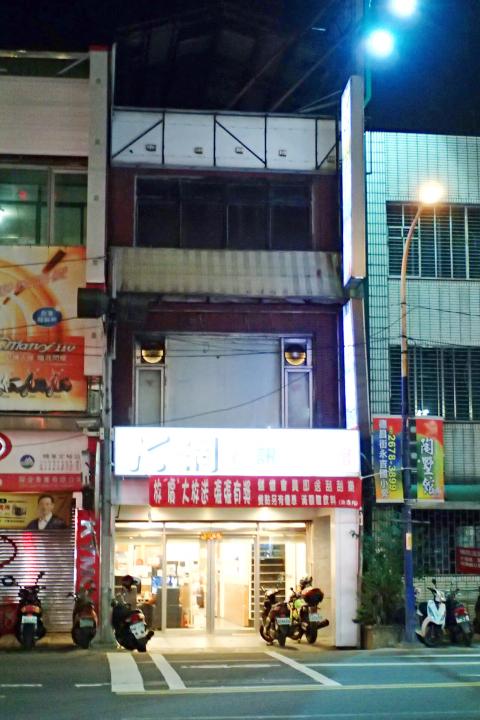A man was found dead at an Internet cafe in New Taipei City after a five-day-straight marathon of computer gaming in the latest case of video game-related death in the nation.
The incident was reported from an Internet cafe in New Taipei City’s Yingge District (鶯歌), when a 38-year-old man surnamed Chu (朱) was found dead in the establishment’s bathroom on Thursday afternoon.
According to the manager of the Internet cafe, Chu entered the establishment on Saturday and played video games for five days straight.

Photo by Yu Heng, Taipei Times
Chu ordered instant noodles and drinks to consume while at the computer table, but otherwise mostly stayed planted in his seat to eat and drink, with the odd sleeping session interspersed throughout the five days, the manager said.
“Except for going to the bathroom, taking cigarette breaks and occasional quick meals, the man did not leave his seat,” the manager said.
The tragic death was discovered on Thursday afternoon when other customers complained that someone was hogging the bathroom’s toilet.
One of the Internet cafe’s attendants went in to investigate and found Chu lying face down on the toilet seat.
An ambulance was called and after arriving, the paramedics found Chu’s body already cold and his face bluish-black, indicating that he had been dead for several hours.
As a preliminary examination of the site showed no signs of a fight and there were no clear injuries on the body, the police have ruled out homicide.
Medicines to treat liver disease and gall stones were found in Chu’s motorcycle seat-trunk.
Police officers said that Chu likely perished because of his medical condition, which was exacerbated by fatigue and physical exhaustion after five days playing computer games.
This is the latest in a number of cases in recent years in Taiwan of computer gamers suffering “sudden death” after playing sessions lasting from a dozen hours to a few days.
In February last year, a man surnamed Wang (王), 40, died after playing games for 13 hours at an Internet cafe in Greater Kaohsiung.
Attendants found Wang dead, but his eyes were still open and staring at the screen as though he were still playing.
In August 2013, a 35-year-old man surnamed Chang (張) was found dead in his seat after playing games for 10 hours at an Internet cafe in Hualien City.
One of the most infamous cases was the death of a 23-year-old man surnamed Chen (陳), who died clutching a keyboard and mouse while staring ahead due to rigor mortis, at an Internet cafe in New Taipei City’s Sanchong District (三重) in February 2012.
He had reportedly gone 23 hours straight playing games without leaving his seat.

INVESTIGATION: The case is the latest instance of a DPP figure being implicated in an espionage network accused of allegedly leaking information to Chinese intelligence Democratic Progressive Party (DPP) member Ho Jen-chieh (何仁傑) was detained and held incommunicado yesterday on suspicion of spying for China during his tenure as assistant to then-minister of foreign affairs Joseph Wu (吳釗燮). The Taipei District Prosecutors’ Office said Ho was implicated during its investigation into alleged spying activities by former Presidential Office consultant Wu Shang-yu (吳尚雨). Prosecutors said there is reason to believe Ho breached the National Security Act (國家安全法) by leaking classified Ministry of Foreign Affairs information to Chinese intelligence. Following interrogation, prosecutors petitioned the Taipei District Court to detain Ho, citing concerns over potential collusion or tampering of evidence. The

NEGOTIATIONS: Taiwan has good relations with Washington and the outlook for the negotiations looks promising, Minister of Economic Affairs J.W. Kuo said Taiwan’s GDP growth this year is expected to decrease by 0.43 to 1.61 percentage points due to the effects of US tariffs, National Development Council (NDC) Minister Paul Liu (劉鏡清) said at a meeting of the legislature’s Economics Committee in Taipei yesterday, citing a preliminary estimate by a private research institution. Taiwan’s economy would be significantly affected by the 32 percent “reciprocal” tariffs slapped by the US, which took effect yesterday, Liu said, adding that GDP growth could fall below 3 percent and potentially even dip below 2 percent to 1.53 percent this year. The council has commissioned another institution

TRADE: The premier pledged safeguards on ‘Made in Taiwan’ labeling, anti-dumping measures and stricter export controls to strengthen its position in trade talks Products labeled “made in Taiwan” must be genuinely made in Taiwan, Premier Cho Jung-tai (卓榮泰) said yesterday, vowing to enforce strict safeguards against “origin laundering” and initiate anti-dumping investigations to prevent China dumping its products in Taiwan. Cho made the remarks in a discussion session with representatives from industries in Kaohsiung. In response to the US government’s recent announcement of “reciprocal” tariffs on its trading partners, President William Lai (賴清德) and Cho last week began a series of consultations with industry leaders nationwide to gather feedback and address concerns. Taiwanese and US officials held a videoconference on Friday evening to discuss the

NEGOTIATIONS: The US response to the countermeasures and plans Taiwan presented has been positive, including boosting procurement and investment, the president said Taiwan is included in the first group for trade negotiations with the US, President William Lai (賴清德) said yesterday, as he seeks to shield Taiwanese exporters from a 32 percent tariff. In Washington, US Trade Representative Jamieson Greer said in an interview on Fox News on Thursday that he would speak to his Taiwanese and Israeli counterparts yesterday about tariffs after holding a long discussion with the Vietnamese earlier. US President Donald Trump on Wednesday postponed punishing levies on multiple trade partners, including Taiwan, for three months after trillions of US dollars were wiped off global markets. He has maintained a 10 percent